Brake Repair, Service, and Inspections in San Antonio, TX
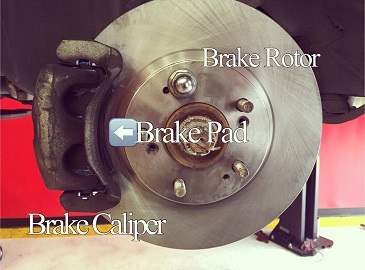
Auto Service Experts Brake Shop
For top quality, reliable brake repair in San Antonio, trust your vehicle to the specialists at Auto Service Experts. Our ASE-certified master technicians have specialized in automotive braking systems for over 20 years. We use only high quality & OEM parts to ensure lasting performance and safety, and back our work with a complete warranty on parts and labor.
Your vehicle’s braking system is integral to the safety of you and your family and are one of the most important automotive systems to monitor and service regularly. Without proper maintenance and timely repair, the wear and tear can increase the time and distance required to stop your vehicle in an emergency. Routine maintenance also helps avoid more serious repairs in the future. Having the pads replaced at recommended intervals can prevent damage to rotors and save money in the long run. Having a brake inspection by a certified mechanic at regular intervals also helps to catch minor problems before they become larger ones.
Brake Job by Auto Service experts Mechanic
ASE Certified automotive technician Roman Oliveras replaces pads and rotors in order to restore reliable, smooth vehicle stopping power.
Our professional mechanics are committed to providing exceptional service at affordable prices.
When having your brakes serviced, it is essential to be aware of the significant difference in quality between various pads. Budget pads may be cheaper upfront but are not a good investment over the long term. This is because you will have to pay for the labor every time they wear out. Pads that last three years are a much better investment than cheaper ones, which will need to be replaced annually. Higher-quality pads also offer better stopping power, quieter braking, and less dust.
Many of our brake pad replacements feature CarQuest Wearever pads, which are specially engineered to provide exceptional stopping power, extended lifetime performance, and cleaner wheels. These ceramic and semi-metallic formulated pads are designed for quiet, smooth, and consistent braking, and are backed by a limited lifetime warranty. If you are unsure which pads are best for your specific vehicle and driving conditions, call and speak with one of our friendly automotive consultants – we are always happy to help!
Most people are aware that brake problems pose a significant safety concern. In the event of failure, you won’t be able to stop the vehicle and may crash. Did you know that other important safety systems also rely on the proper operation of the braking system? This system affects the functioning of the stability control, traction control, and anti-lock brake systems.
Disc brakes are composed of rotors (also known as discs), calipers, and pads. Rotors are connected to the wheel. When you press the brake pedal, pressure is transferred to the pads inside the caliper, located on either side of the rotor. Pressure from the pads slows the rotation of the rotors, which slows the wheels and eventually stops the vehicle.
Braking System Operation & Service Recommendations
Pads are designed with friction material that slows the rotor when pressure is applied. As this material wears away, the metal beneath it begins to contact the rotor, resulting in decreased stopping power. When the pads need to be replaced, you will hear a screeching or whining noise. Replacing the pads when recommended helps prevent damage to the rotors and ensures you can stop your car in an emergency situation.
Rotors need to be machined (resurfaced) or replaced periodically as they become warped, cracked, or scratched. They may also wear down below factory specifications, leaving insufficient material to make contact with the pads. In this situation, rotor replacements are required. Rotors should always be inspected during service. New pads on bad rotors will not provide adequate performance. The price of new rotors has decreased significantly, and it is now often more cost-effective to replace them than to resurface.
Brake Inspections
If brake failure occurs while you are driving, it is a terrifying experience! Routine inspections can ensure that it never comes to that. Most people know that if they hear a squealing or chirping noise when slowing the vehicle, it’s time for service. This sound is usually caused by a metal tab built into the pad, which serves as an early warning indicator that it is time for replacement. If the pads have worn away completely, you may hear a grinding noise caused by the metal beneath the pad grinding against (and damaging) the rotor.
There are several other important components in the system that can also become loose, damaged, or fail over time. If you hear a “chattering” sound, it may be caused by a loose component (such as a pad or caliper) and should be diagnosed immediately to avoid complete brake failure. If a component completely breaks off, you may not be able to stop your vehicle.
Custom machine work to replace rear drum brakes on a 1974 Chevy K5 Blazer with rear disk brakes from a 2005 Chevy Avalanche 4×4.
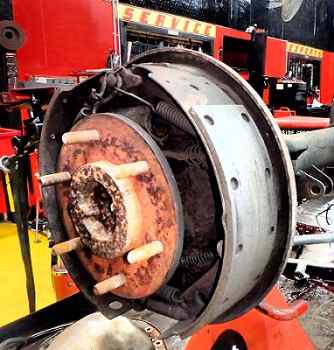
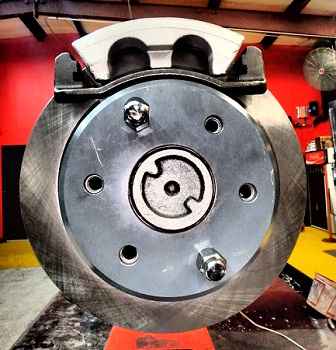
Any time you notice anything unusual while braking, take your vehicle to a trustworthy shop for an inspection. Signs of brake problems include a decline in performance, unusual noises, a brake pedal that is very hard to push in, or a soft and spongy pedal. The best way to minimize component damage and avoid safety issues is to follow the manufacturer’s service schedule and have routine inspections at the recommended intervals. Auto Service Experts’ certified mechanics thoroughly inspect all major system components every time we perform service. By ensuring that all components are in proper operating condition, we can back our repairs with a full 3-year/36,000-mile warranty on Parts and Labor.
Following a few driving and brake service/maintenance tips helps prevent major repair due to unnecessary damage to the system. See our Auto Repair Blog for helpful advice on this topic and much more! Watch the video on this page for information on System Operation and Importance of Routine Service!
Brake Problems? Come see the certified brake specialists at Auto Service Experts.
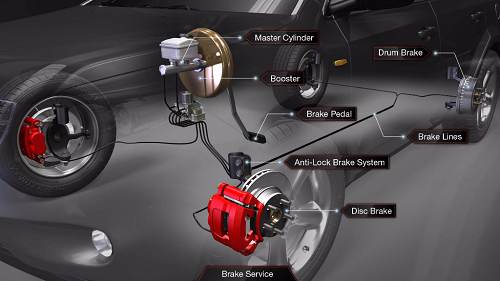
Brake System Components
Several common signs indicate a need for service:
Dashboard Brake Light
Your vehicle is equipped with a dashboard brake service/repair warning light to alert you to problems within the system, such as low fluid or worn pads. Do not ignore this light! Having an inspection immediately upon noticing this light can prevent further damage, save you money, and possibly save your life. That being said, there are also circumstances when a repair is required, but the warning light does not come on, so it is best to follow the manufacturer’s recommended service/ inspection schedule. For more detail on this subject see our blog article on automotive maintenance and vehicle safety warning lights.
A car’s dashboard brake light is connected to both the emergency brake and the auto braking system. It automatically illuminates when the emergency brake is engaged. If it remains illuminated when the E brake is off, it indicates an issue. The most common issue is low fluid. Low fluid is not caused by normal wear and tear, it doesn’t evaporate or get used up. This means that it is likely caused by a leak in the system (possibly in a hose, connection, or reservoir).
ABS Light
Issues within the ABS (Anti-lock Braking System) may cause a warning light to illuminate, which is typically amber in color. Most modern vehicles are equipped with a separate ABS light. A red warning light may indicate a system imbalance and suggest that your vehicle requires an inspection.
Some vehicles are also equipped with a wear indicator that triggers the light when the pads are worn down to a certain level and need to be replaced. If pads are extremely worn, the piston has to travel further to make contact, pulling additional fluid down with it. In this situation, the fluid level is low because it has a greater area to cover, not because fluid has leaked out leaving less in the system.
Grinding
A metallic grinding noise means that the pads need to be replaced immediately. Driving with worn-through pads causes more damage to your vehicle, can turn a minor problem into a major one, and, most importantly, endangers you and others. This is one of the most serious signs of a vehicle that desperately needs maintenance.
Our Complete Brake Check Includes the Following Inspections:
- Fluid Condition (when fluid is exposed to moisture it becomes acidic and can damage the seals and ABS module).
- Lines
- Pads
- Calipers
- Emergency Brake Adjustment
- Hoses
- Rotors
- Check for leaks in:
- Fitting Hoses
- Junction Blocks
- Lines
- Master Cylinder
- Modules
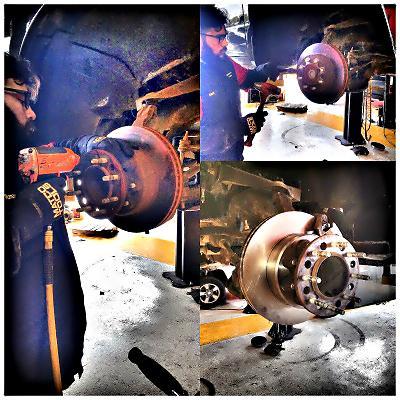
Brake Job on 2012 Dodge Ram 350
Chirping Noise or Squealing Brakes
Brake pads are designed to tell you when they require service. Once they have been worn down to the recommended replacement level, a metal warning tab makes contact with the rotors, causing a high-pitched squealing noise. This noise is noticeable at slow speeds and typically disappears when pressure is applied to the pedal.
Low or Fading Pedal
If your pedal sinks to the floorboard when you stop your car or if you have to pump the pedal to stop the vehicle, this could indicate an internal leak in the master cylinder or its lines. This is a serious and potentially dangerous condition that requires immediate attention by qualified technicians.
Drag/ Vehicle Pulling To The Side
Caliper slides or pistons can become stuck causing them to apply uneven pressure. Catching this problem quickly can keep you from having to replace your rotors due to uneven wear and damage. This is an example of when a timely inspection can save you from more costly repairs down the road.
If you experience any of these warning signs, bring your car in for a complete system inspection. Auto Service Experts’ ASE-certified master mechanics have state-of-the-art diagnostic equipment, extensive experience, and the technical skills to handle any repair or service need, whether minor or major.
Why Routine Service and Inspections are Necessary
While auto brake performance has steadily improved over time, these systems still require thorough inspection at least once a year, including removal of the wheels and examination of all hidden internal components. The above conditions are obvious signs that service is required. However, keeping up with regularly scheduled maintenance before signs of problems appear can save you a lot of money and unnecessary inconvenience.
Several factors affect the lifetime and performance of your braking system. Driving in heavy stop-and-go traffic, riding your brake pedal, and slamming on the brakes can all cause the system to wear out faster than normal. Replacing worn pads before they allow metal components to connect and wear on one another can help you to avoid more costly repairs such as replacing drums or rotors.
Proper auto suspension system maintenance also affects braking performance. Driving with worn shocks or struts can significantly increase the time it takes to bring your car to a complete stop. Your car’s brakes rely on maintaining constant contact with the road and require proper vehicle weight distribution to function correctly. As shocks and struts gradually wear out, the consistency of the wheels’ contact with the road is decreased, and weight is unevenly distributed. Driving on the highway with worn shocks can increase the vehicle’s stopping distance by as much as 22 feet.
Benefits of Regular Inspection:
- Peace of mind – Protect your safety and that of your family.
- Save Money – Detect minor issues before they cause further damage, which requires major repairs.
